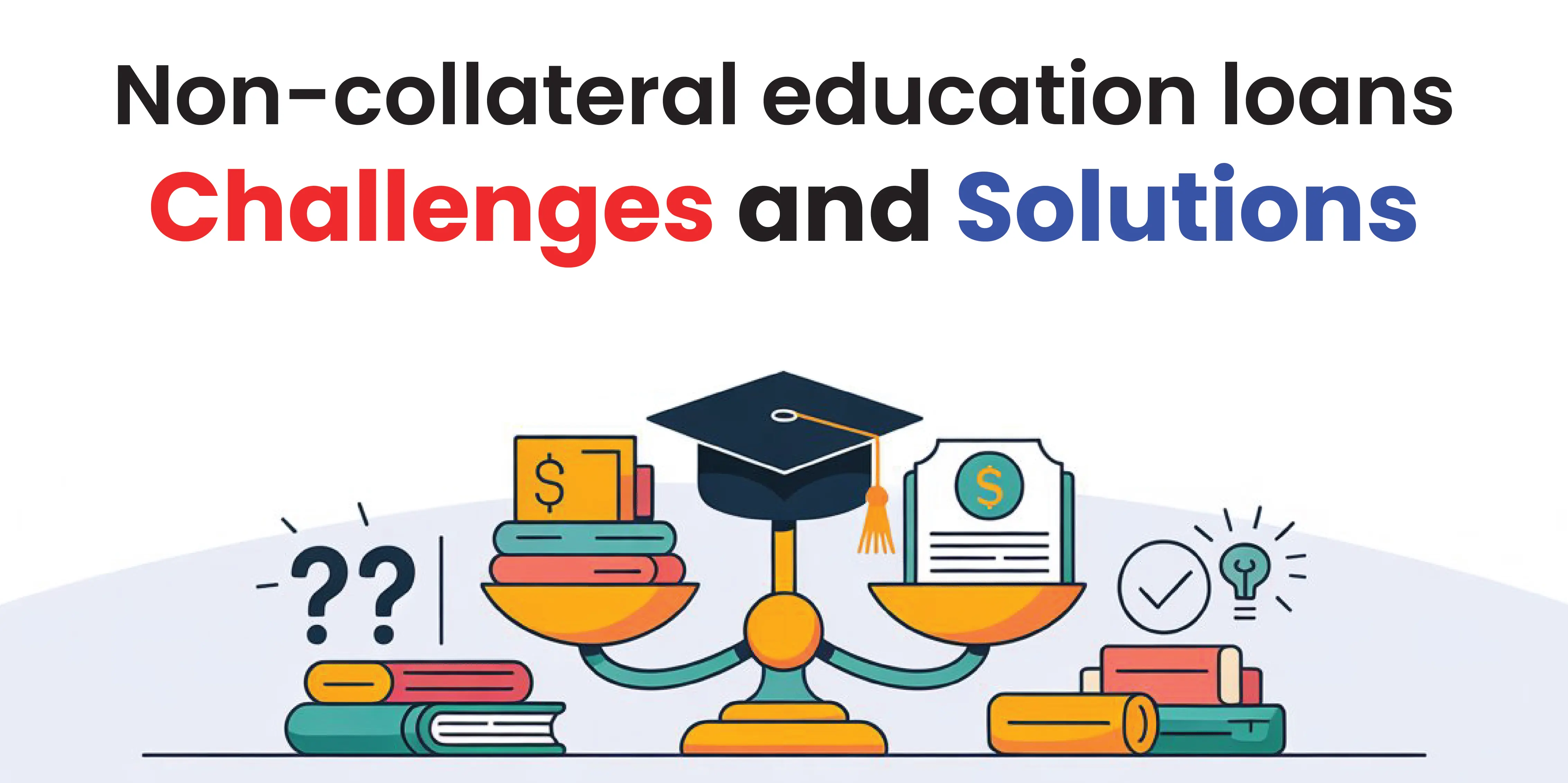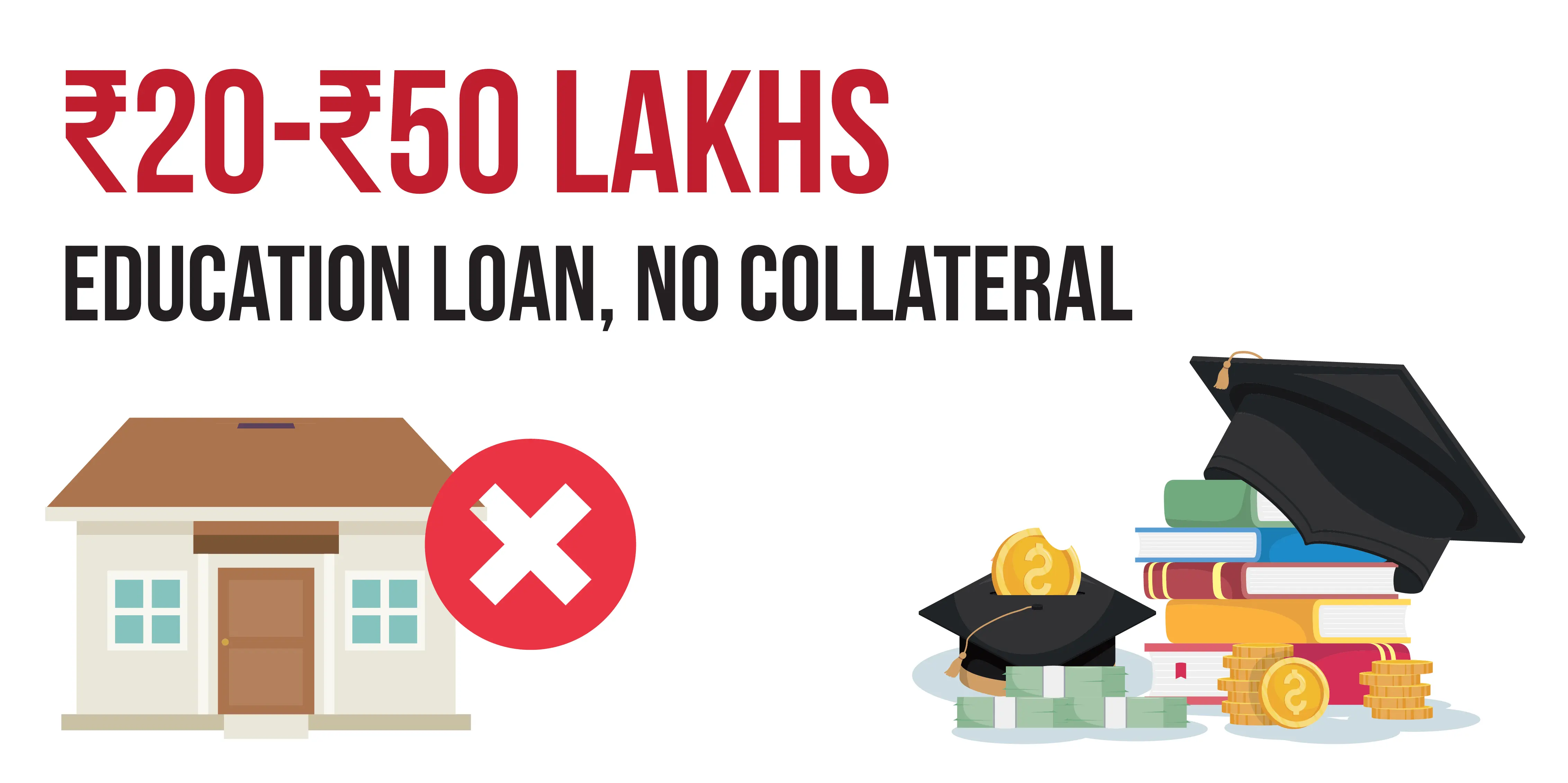https://www.wemakescholars.com/blog/issues-and-solutions-of-non-collateral-education-loan
Smart Solutions for Non-Collateral Education Loans
Non-Collateral/ Unsecured Education Loan | Updated on ()

Many students prefer a non-collateral education loan to fund their higher studies abroad. This is because the process is relatively straightforward, with less paperwork, and doesn't require the pledging of assets as collateral security. These loans are best suited for candidates who require an education loan in a short period of time or who do not own assets with a high market value.
However, there are several common issues that students may face during their education loan process. This article highlights some of those common issues faced by candidates in their non-collateral education loan process.
These common issues are also the top reasons behind an education loan rejection by lenders. In this article, we will also discuss the solutions to the challenges faced in the non-collateral education loans. With that being said, let's begin.
What are the Common Challenges in non-collateralized Education Loans?
Students, while applying for Non-Collateral education loans, it is better to be prepared for the challenges and fix them. This makes the education loans process hassle-free. Below few are the common challenges that students may face in non-collateral education loans.
1. CIBIL Score Issues
The challenge
- This is the primary assessment that any lender does to offer non-collateralized education loans. Almost all financial institutions consider several aspects of your and your co-applicant's profile. And they are quite strict when it comes to one particular metric, the CIBIL score.
- If your CIBIL report shows serious issues like loan write-off/ loan waiver-off, loan settled, or cheque bounces, banks would never approve your loan application.
- The CIBIL generally ranges from 300 to 900; a score of 700 to 900 is considered a good credit score. Students usually face issues when either their own or their co-applicant's CIBIL score is low on the CIBIL report. The reason behind a low CIBIL score could be anything from defaulting on previous loan payments to applying for too many credit cards.
The Solution
- First, clear off your small debts, lower your debt-to-income ratio, and avoid applying for extra credit cards. All these put together can improve your CIBIL score. If you cannot make the complete payment on time, make sure to clear at least the minimum amount due at least. Taking these steps can build your CIBIL score again.
- Double-check your credit reports because sometimes an error in a transaction can also affect your credit score. If you think there’s been a mistake, file a dispute with the credit bureau and fix the issue.
2. Financial Co-applicant Income Issues
The challenge
- The financial profile of your co-applicant is considered by private lenders for approving non-collateral education loans. This is because private lenders ask for payment of interest during the moratorium period. And while students are abroad, their co-applicants are supposed to be making those payments.
- In secured loans, the lender can use the pledged collateral to recover the amount in the event of default. In an unsecured education loan, the financial co-applicant is supposed to pay the loan if, for some reason, a student fails to pay it back.
- The issue comes when the income of your co-applicant is low. The requirements for a salaried and self-employed co-applicant are also different for different lenders. And not just income, private lenders also check the age and reject the loan application for an aged co-applicant and a co-applicant with low income.
The Solution
- If the income is too low, say the minimum income lenders need is 5 lakhs per annum, but your co-applicant earns 2 lakhs per annum. It is better to try for a secured education loan from public banks. If you do not have collateral of your own, you can also pledge third-party collateral (relatives, friends) if they are fine with it.
- If the income is slightly lower than the required minimum income, say 4 lakhs (as per the above example), adding another co-applicant with income, say 3 lakhs per annum, can approve your loan.
- The problem here is that you will not know what the minimum ask is by the lender for approving the loan. Because it depends on case to case, and many a time, lenders simply reject the loan application without explaining to you why. This is why we recommend you apply for your education loan via WeMakeScholars. Your financial officer will analyze your profile and will tell you in advance if any such issue emerges, and will suggest the best solution for the same.
3. Education Loan disbursement
Challenge
- Education loan cash sent to the student's account or a university is called a loan disbursement. Countries like Canada, Germany, and Australia require to show proof of funds before their visa application.
- When students ask for a loan disbursement, the lenders ask for a visa first. This usually creates complications for students.
Solution
- To solve this issue, financial institutions offer a pre-Visa disbursement or a loan sanction letter, with which you can get a visa. This letter generally confirms the loan approval and amount. This letter is also accepted as proof of funds for a visa application in many countries.
- When applied education through WeMakeScholars, we make sure that the loan sanction letter is issued on time. Also, we ensure a smooth education loan application process.
4. Insufficient Loan amount
Challenge
- Since collateral is not pledged in non-collateral education loans as security, lenders usually impose a loan limit. This sanctioned loan amount may not cover all expenses, including tuition, living, and travel expenses. These insufficient loan amounts can cause students to search for some extra funds outside.
Solution
- Students presenting a comprehensive budget, detailing all anticipated expenses, can make banks reassess and increase the loan amount. If applied through WeMakeScholars, we negotiate with the lenders on your behalf and try to get the required loan amount sanctioned.
5. High Interest rates and Limited Loan options
Challenge
- Usually, the interest rates on non-collateral education loans are higher than those of collateral loans. To avoid the risk associated with lending money without pledging any collateral, lenders follow this. This makes the repayment burdensome for students. Sometimes, banks may also impose some hidden charges and extra fees, making the overall cost of education expensive.
Solution
- It is recommended to compare the loan offers with multiple lenders, compare interest rates. Processing fees, repayment terms, and other terms and conditions. Request for a clear breakdown of all the charges.
6. Lengthy and complex application process
Challenge
- The paperwork and the loan process in collateral education loans are overwhelming. This is because lenders are cautious when they offer these loans without any security. They assess every detail of the applicant and the co-applicant, and sometimes this can cause stress and potential loss of admission offers.
Solution
- Seeking advice from a financial advisor or an education loan consultant like WeMakeScholars can make the process simple and ensure timely approvals and disbursals.
What is the Eligibility Requirement for non-collateral Education loans?
The eligibility criteria for a non-collateral education loan vary depending on various factors such as the country, the student's profile, and the co-applicant's financial status. The common non-collateral education loan requirements are given below.
-
Citizenship: Both the applicant and the co-applicant should be indian citizens.
-
Age: Students aged 16 or older can take an education loan.
-
Academic Performance: A strong academic history can better the chances of unsecured or non-collateral education loan approval.
-
Co-applicant: A good co-applicant with stable income and a good credit history adds weight to the student profile.
-
Courses and Countries: Some courses and countries are loan favoured, such as the USA, UK, Canada, Australia, Germany, New Zealand, France, and many more. STEM courses are usually highly preferred for an education loan without collateral.
What are the Documents required for the Non-Collateral Education loan?
The documents list may be influenced by various factors such as the loan type, student profile, etc. However, the basic documents list is given below.
KYC Documents: The applicant and the co-applicant are required to submit the documents proving their identity.
-
PAN card
-
Aadhar card
-
Passport
-
Voter ID
Academic Records: The previous academic records of the student, such as 10th,12th, Graduation (if applicable), etc.
Admission Proof: The documents proving the admission status from the respective university.
Coapplicant financial document details
-
KYC documents
-
Latest Salary slips (of the last 3 months)
-
Form 16 for the last 2 years.
-
Employer's ID card
-
ITR of last 2 yrs
Documents to be submitted by self-employed co-applicants:
-
ITR of last 3 yrs
-
Last 3 years Balance sheet and Profit & Loss account (only if self-employed)
-
Proof of Business address
How to apply for an Education Loan Via WeMakeScholars?
Applying for an education loan Via WemakeScholars involves a complete online process.
-
Fill in the details in the application form on our WeMakeScholars website.
-
Once you submit the application form, our Financial Officer will contact you.
-
Provide all the details regarding your loan, and our Financial Officer will analyse your profile and check your eligibility.
-
Later, submit your documents, which will be shared by your financial officer on our WeMakeScholars website only.
-
Your file will be logged in. Once the login is created, you can check your loan application status.
-
You will get your loan sanction letter within 6 working days.
You can always contact your financial officer to know about your education loan status.
Benefits of Going through WeMakeScholars
Applying education loan on your own can be a little complicated due to problems like complex documentation work, multiple visits to the bank, poor customer service, lack of knowledge on loan terms. Going through WeMakeScholars can help you get you education loan without any hassle. Some of the benefits are:
-
Expert Advise
-
End-to-End Support
-
Faster Processing Time
-
Negotiation Support
-
Digitalized Process
Conclusion
Non-collateral education loans are a great way to finance your education abroad, especially when you do not have a property, asset, or any security to pledge. However, these loans also come with many challenges. This blog covers the common challenges that students face while applying for noncollateral education loans. In addition, we also provided you with the solution for the same, which helps students make informed decisions about non-collateral education loans





Kindly login to comment and ask your questions about Scholarships & Education Loans